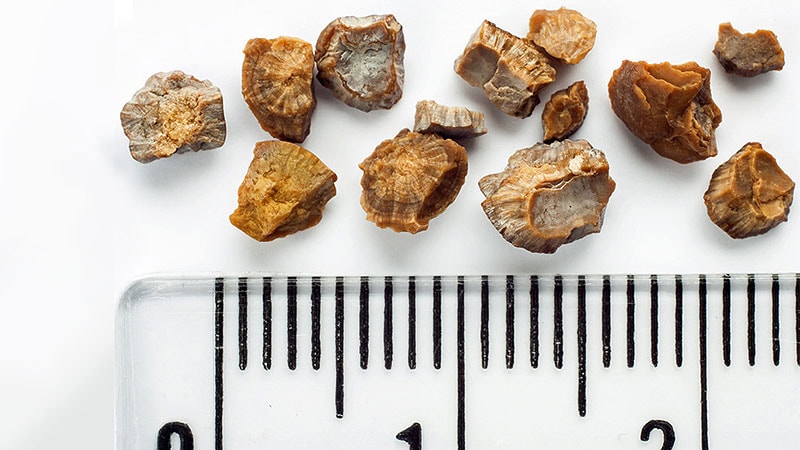Rising Incidence of Kidney Stones and Lack of Specialists
Kernekoncepter
Lack of kidney stone specialists is a growing concern, emphasizing the need for prevention and specialized care.
Resumé
The content discusses the increasing incidence of kidney stones and the shortage of specialists in the field. It highlights the importance of prevention, the role of primary care physicians, and the necessity of nephrologists in managing kidney stones. The content also addresses the chronic nature of kidney stones and the associated health risks, emphasizing the need for a holistic approach to patient care.
- Shortage of kidney stone specialists
- Importance of prevention and specialized care
- Role of primary care physicians in counseling patients
- Chronic nature of kidney stones and associated health risks
- Necessity of nephrologists in managing kidney stones
- Increasing incidence of kidney stones in various demographics
- Decline in residents choosing nephrology specialization
- Importance of nephrologists in diagnosing and preventing kidney stones
- Case study illustrating the impact of specialist care on patient outcomes
Tilpas resumé
Genskriv med AI
Generer citater
Oversæt kilde
Til et andet sprog
Generer mindmap
fra kildeindhold
Besøg kilde
www.medscape.com
Kidney Stones on the Rise: Where Are the Specialists?
Statistik
A study found that the annual incidence of kidney stones increased by 16% from 1997 to 2012.
Black Americans have higher rates of kidney stone development compared to White counterparts.
A 2023 report by the American Society of Nephrology noted a 50% decrease in nephrology fellowship choices from 2009 to 2019.
Citater
"If we can think about this holistically, we can really make strides." - Gregory E. Tasian
"Understanding these episodes as a chronic disease can also explain why nephrolithiasis often goes hand in hand with higher instances of heart attack and stroke, hypertension, and bone breaks." - Gregory E. Tasian
"Even if they are passing the stones on their own without surgery, they should really be evaluated by a urologist or a nephrologist." - Irina Jaeger
Vigtigste indsigter udtrukket fra
by Kaitlin Sull... kl. www.medscape.com 08-23-2023
https://www.medscape.com/viewarticle/995778
Dybere Forespørgsler
How can the healthcare system encourage more residents to specialize in nephrology to address the shortage of kidney stone specialists?
To address the shortage of kidney stone specialists, the healthcare system can take several steps to encourage more residents to specialize in nephrology. One approach is to increase exposure to nephrology during medical education and training. By offering more rotations, lectures, and hands-on experiences in nephrology, medical students and residents can develop a deeper understanding and interest in the field. Additionally, providing mentorship programs and networking opportunities with established nephrologists can inspire residents to pursue a career in this specialty. Offering incentives such as scholarships, research opportunities, and loan forgiveness programs for those specializing in nephrology can also attract more residents to the field. Moreover, raising awareness about the importance and impact of nephrology in patient care through targeted campaigns and educational initiatives can help highlight the value of becoming a kidney stone specialist.
What are the potential consequences of not involving a nephrologist specializing in kidney stones in patient care?
Not involving a nephrologist specializing in kidney stones in patient care can have significant consequences on patient health outcomes. Nephrologists play a crucial role in diagnosing the root causes of kidney stones and developing personalized treatment plans to prevent recurrence. Without their expertise, patients may miss out on essential preventive measures and specialized treatments that could improve their quality of life and reduce the risk of complications. Failure to involve a nephrologist may result in misdiagnosis, inadequate management of underlying conditions contributing to kidney stones, and a higher likelihood of recurrent stone formation. Additionally, without the guidance of a nephrologist, patients may not receive comprehensive care that addresses the holistic aspects of kidney stone management, leading to suboptimal outcomes and potentially worsening health conditions.
How can advancements in genetic testing and specialized treatments improve outcomes for patients with kidney stones?
Advancements in genetic testing and specialized treatments offer promising opportunities to enhance outcomes for patients with kidney stones. Genetic testing can help identify underlying genetic disorders that predispose individuals to kidney stone formation, enabling targeted interventions and personalized treatment strategies. By understanding the genetic basis of kidney stones, healthcare providers can implement preventive measures tailored to the individual's genetic profile, leading to more effective management and reduced recurrence rates. Specialized treatments, such as new experimental drugs like nedosiran for primary hyperoxaluria, present innovative options for patients with complex kidney stone conditions. These treatments, developed based on genetic insights and scientific advancements, have the potential to improve patient outcomes, prevent complications, and offer new avenues for managing challenging cases of kidney stones. Overall, the integration of genetic testing and specialized treatments into kidney stone care can revolutionize the field, offering patients more precise and effective solutions for their condition.
0
